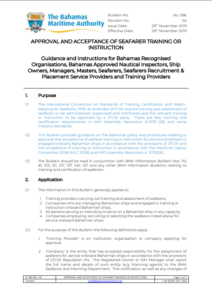The Bahamas Maritime Authority has recently issued guidance and instructions concerning the Bahamas policy and procedures relating to the approval and acceptance of seafarer training or instruction for seafarers employed or engaged onboard Bahamian ships.
Notably, the bulletin aims to provide guidance to Bahamas recognized organizations; Bahamas approved nautical inspectors; ship owners; managers; masters; seafarers; seafarers recruitment & placement service providers as well as training providers, in accordance with the provisions of STCW and the acceptance of training or instruction in accordance with the Maritime Labour Convention 2006 (MLC 2006) and IMO Assembly Resolution A. 1079(28).
Information in the bulletin applies to:
- Training providers carrying out training and assessment of seafarers;
- Companies who are managing Bahamian ships and engaged in training or instruction onboard Bahamian ships;
- All persons serving or intending to serve on a Bahamian ship in any capacity;
- Companies employing, recruiting or selecting the seafarers noted above for service onboard Bahamian ships.
It is added that the BMA will initiate an approval process for training or instructions under “a quality standard system”, which satisfies one of the following
- The training/instruction is being conducted by a training provider within The Bahamas OR
- The training/instruction is being conducted by an Owner or Company operating Bahamian ships for seafarers who will be sailing on Bahamian ships and such training/instruction only relates to the requirements of STCW Chapters V and VI or shipboard training for ratings in accordance with STCW Chapters II and III.
[smlsubform prepend=”GET THE SAFETY4SEA IN YOUR INBOX!” showname=false emailtxt=”” emailholder=”Enter your email address” showsubmit=true submittxt=”Submit” jsthanks=false thankyou=”Thank you for subscribing to our mailing list”]
Adding to this, BMA highlights that may initiate an approval process for other training program not satisfying the criteria above at its discretion as “an exceptional consideration”, with terms and conditions for such approval process to be determined by them in each case.
Any training or instruction will be assessed taking into consideration the principles outlined in the STCW and any relevant guidelines developed by the IMO and industry, underlining that BMA considers that training or instruction based solely on computer, video or other electronic medium may not satisfy the practical elements of many STCW requirements and if such training is approved by the BMA, noting that a restriction may be imposed on the shipboard duties of persons who have undergone such training or instruction. BMA has approved some training providers and a list can be found on their website.
Whatsoever, it was said that over 70% of the respondents of MarTID (Maritime Training Insights Database) survey initiative, World Maritime University (WMU) expect an increase in simulators and e-learning in the coming years. In 2019, traditional classroom teaching, and simulation training are the most popular training methods for operators, while there has been much debate about whether e-learning in maritime industry works or not. Some believe there is no replacement for hands-on training, others believe there is.
To find out more about the BMA bulletin, click on the PDF bellow.








































![]](https://safety4sea.com/wp-content/uploads/2024/06/shutterstock_2318996555-350x250.jpg)






















